1 Million Forest Trees Planting

1 Million Forest Trees Planting
In January 2021, Prime Minister, Tan Sri Muhyiddin Yassin planted a Merbau tree in the garden of Seri Perdana to kick off the 100 Million Tree-Planting Campaign 2020-2025. It was the start of Greening Malaysia agenda by planting 100 million trees across the country, initiated by Ministry of Energy and Natural Resources Malaysia (www.100jutapokok.gov.my ). In July 2019, Ministry of Primary Industries and Commodities (MPIC) launched a similar programme as an initiative to uplift the image of Malaysian palm oil industry.
The “1 Million Forest Trees Planting” Programme, was launched in collaboration and strong support from Sabah Forestry Department (SFD) with the aim for a greener Malaysia in line with the Sustainable Development Goals and the Paris Agreement. This project was initiated under the Malaysian Palm Oil Green Conservation Foundation (MPOGCF).
The programme is part of the Ministry of Plantation Industries & Commodities’ effort to counter negative perspective on Malaysian palm oil industry
Despite being challenging and expensive, forest restoration efforts are immensely rewarding and beneficial as acknowledged by the ministry and the Malaysian government. Acknowledging this fact, the memorandum of understanding (MOU) for “Forest Rehabilitation of Orangutan Habitat at Lower Kawag, Ulu Segama Forest Reserve” was signed by YBhg. Datuk Mashor Mohd. Jaini, Chief Conservator of Forests, Sabah and YBhg. Datuk Dr. Kalyana Sundram, Chief Executive Officer, MPOC.
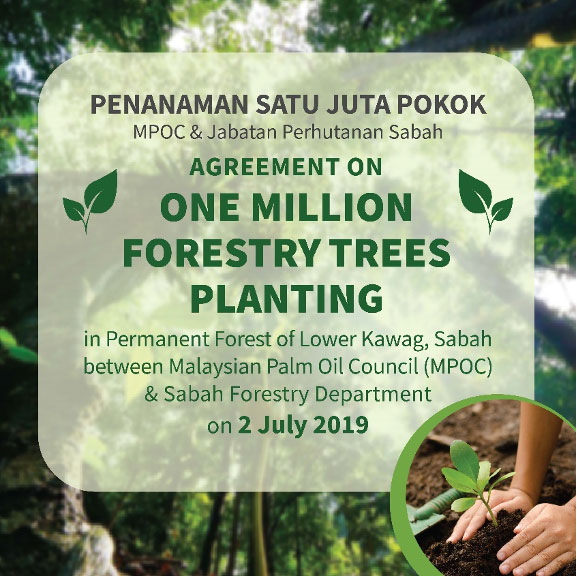 The MPOC with SFD have identified 2,500 hectares of degraded forest in Lower Kawag, part of Ulu Segama – Malua Forest Reserve in Lahad Datu, to be planted with fast growing indigenous forest species and native fruit trees. This is done with the engagement of local communities that also offers them an opportunity for an additional income stream and at the same time preserving the forest landscape. The programme will also enrich forest biodiversity in the selected area that will also act as wildlife corridors and wildlife refugia in the long run. Through this 10 year programme MPOC will solicit support in term of in-kind and financial contribution, from oil palm companies to plant forest trees in the project site.
The MPOC with SFD have identified 2,500 hectares of degraded forest in Lower Kawag, part of Ulu Segama – Malua Forest Reserve in Lahad Datu, to be planted with fast growing indigenous forest species and native fruit trees. This is done with the engagement of local communities that also offers them an opportunity for an additional income stream and at the same time preserving the forest landscape. The programme will also enrich forest biodiversity in the selected area that will also act as wildlife corridors and wildlife refugia in the long run. Through this 10 year programme MPOC will solicit support in term of in-kind and financial contribution, from oil palm companies to plant forest trees in the project site.
Project Site: Lower Kawag, Ulu Segama – Malua Forest Reserve
The project area of Lower Kawag is part of the Ulu Segama – Malua Forest Reserve in the district of Lahad Datu, Sabah. It covers an area of 2,500 hectares of degraded forest which was severely logged-over and also damaged due to forest fire. This part of the forest reserve is an important wildlife corridor to many including the endangered Bornean pygmy elephant (Elephas maximus borneensis) and the Bornean orang-utan (Pongo pygmaeus).
The forest restoration programme focuses on rehabilitating degraded areas by planting fast growing indigenous or dipterocarp species to enhance wildlife habitat especially orangutan habitats.
Project site : Lower Kawag, Ulu Segama – Malua Forest Reserve
Area size: 2,500 hectares
Target: 1 Million forest trees
Project duration: 10 years
Planting and Maintenance
Tree planting is conducted in smaller blocks which are demarcated by surveyors according to natural features of river networks and terrain. Trees are planted in a planting distance of 5m x 5m, according to zig-zag formation to minimise damage by elephants as the project site in Lower Kawag is still actively used by Bornean pygmy elephants for foraging and herd movement along the forest reserves.
There has been several reports of elephants movement in the replanting site, however the mortality rate of seedlings due to trampling are considered low. This remains one of the risks for worker’s safety in this rehabilitation project. Progress is hampered during migration period which happens frequently in this area of the forest.
The project site borders Bukit Piton Forest Reserve, which is small in size but has a huge significance in biodiversity conservation – being the home to approximately 300 orangutans which is totally protected for the continuous survival of the orangutan population. The site may also create better connectivity for the orangutans which are isolated by the palm oil plantations and river networks. Similar restoration project was developed by WWF-Malaysia with Sabah Forestry Department (SFD) in North Ulu Segama in 2007 which was completed in November 2019, by planting more than 300,000 trees over an area of 2,400 hectare of degraded forest.

Tree planting in compartment 153, Lower Kawag, Ulu Segama – Malua Forest Reserve. Source: Sabah Forestry Department
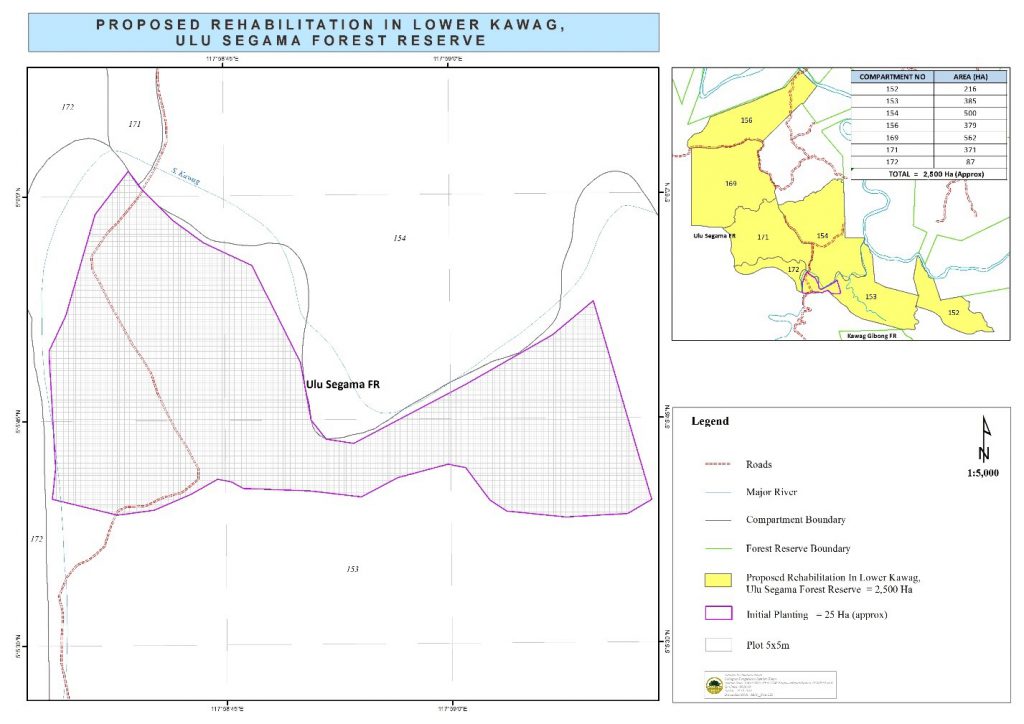
Currently planting materials are sourced from the local community as a CSR initiative where local villagers collects seeds during mass fruiting season from the forest reserve area which is later germinated and raised in domestic nursery established nearby their home. Wildings are also collected and raised for not more than 18 months before they are ready for transportation and transplanting at the project site. SFD organised workshops to educate and train villagers in germinating seeds and raising high quality seedlings for this project. The seedlings will be sold according to the prevailing and agreed rates by both parties. This becomes an additional source of income for the villagers especially for the Kg. Silam and Kg. Perpaduan, Kinabatangan community.
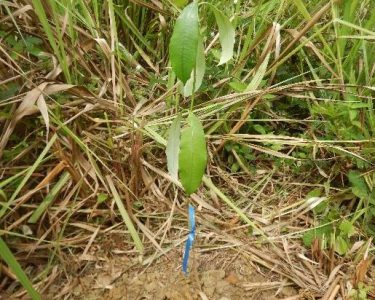
A newly planted Pulai seedling marked with a blue ribbon for visibility
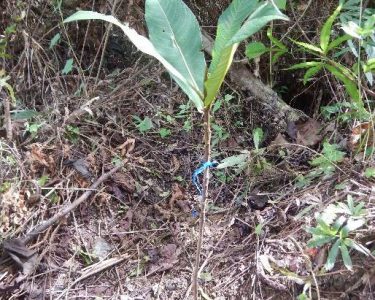
In the project site, open and exposed areas are planted with fast-growing pioneer species such as Pulai (Alstonia angustiloba), Laran (Neolamarckia cadamba), Telisai paya (Planchonia valida) and Bayur (Pterospermum acerifolium) to enhance site establishment as the area is severely degraded. Fruit trees such as Terap (Arthocarpus sp) and Figs (Ficus sp) which form part of the diet for orangutan will also be planted. The site is also planted with native Dipterocarps such as Kapur paji (Dryobalanops lanceolata), Kawang jantung/ Engkabang (Shorea macrophylla), Urata mata (Parashorea spp.), Keruing (Dipterocarpus spp.) and other forest species such as Merbau (Intsia bijuga) from the family Fabaceae.
Seedling maintenance works are a crucial part in tree planting to ensure survival of planted seedlings from creepers and shrubs. Maintenance includes removal of grass, weeds or any other creeping or climbing vines. It is done to remove the choking grasses and vines which may increase the mortality of seedlings planted. Weeding activity which includes line and point clearance is done to ensure the well-being of the seedling planted and this will be done for up 5 years. Any dead seedling will be replaced with new seedlings to ensure high succession rate.
Malaysian Palm Oil Green Conservation Fund (MPOGCF)
 The Malaysian Palm Oil Green Conservation Foundation (MPOGCF) is an initiative mooted by the Minister of Primary Industries. The foundation is established to support conservation initiatives related to the palm oil industry and reflects the commitment of the industry towards conserving our environment. The objectives of the foundation are:
The Malaysian Palm Oil Green Conservation Foundation (MPOGCF) is an initiative mooted by the Minister of Primary Industries. The foundation is established to support conservation initiatives related to the palm oil industry and reflects the commitment of the industry towards conserving our environment. The objectives of the foundation are:
- To encourage and support conservation initiatives and sustainable practices within the palm oil industry;
- To initiate and support reforestation programmes of degraded forests;
- To provide funding assistance for wildlife and biodiversity research; and
- To provide funding for conservation activities including related promotional activities and awareness programmes.
MPOGCF Projects
Since its establishment in 2016, MPOGCF which was then known as MPOWCF has completed 29 projects in collaboration with stakeholders such as Sabah Forestry Department (SFD), Sabah Wildlife Department (SWD), Sarawak Forestry Corporation (SFC), Department of Wildlife and National Parks (PERHILITAN) Peninsular Malaysia, Academia (UNIMAS, USM, Cardiff University, UiTM), NGOs (HUTAN, DGFC, Wild Asia), and Malaysian palm oil industry members.
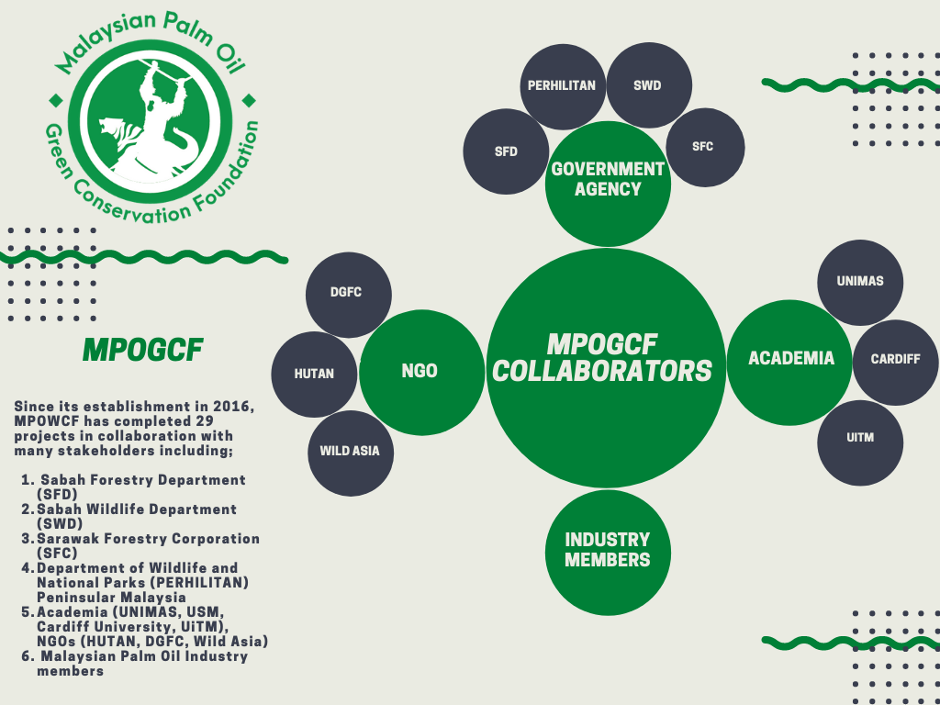
Current Projects
Currently there are 6 ongoing projects involving various stakeholders , namely;
- 1 Million Forest Tree Planting (2019 – current)
- Bornean Elephant Conservation in Sabah through Elephant Grass Planting; A pilot project (2020- on going)
- Bornean Orangutan and Pygmy Elephant Population Survey and Conservation (2019 – current)
- Wildlife Rescue Unit with the Sabah Wildlife Department (2010 – current)
- Tiger Conservation Program in collaboration with PERHILITAN (2021)
- The Borneo Elephant Sanctuary (2012 – current)
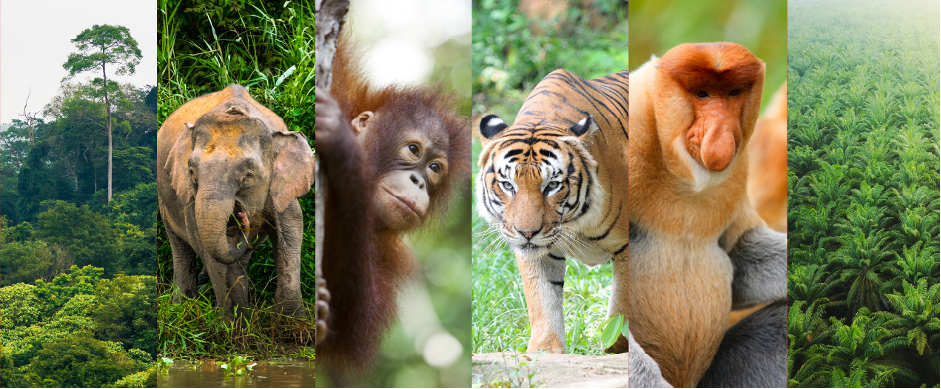
The Malaysian Palm Oil Green Conservation Foundation will continuously initiate and support environmental and conservation projects related to the Malaysian palm oil industry and strongly support the sustainable practices within the industry with strong commitment and networking with various stakeholders towards a sustainable future.
By Anthony K.Veerayan

